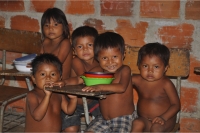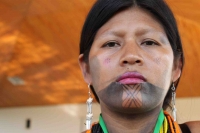

Colombia
América Latina y el Caribe
Colombia
Capital Bogotá
Población 44.9 million
Esperanza de vida 72.5
Acceso al agua potable 93%
Alfabetización de adultos 92.3%
Mortalidad de menores de 5 años 21 per 1,000 live births
PIB per cápita $14,900

 Esta evaluación es un ejercicio para generar conocimiento que busca: 1) evaluar la contribución del F-ODM, a nivel nacional, para alcanzar los ODMs, los principios de la Declaración de París y la iniciativa de reforma de la ONU conocida como "Unidos en la Acción"; 2) identificar buenas prácticas y las lecciones aprendidas para futuros programas conjuntos sobre desarrollo; y 3) conectar a las intervenciones de los programas a nivel local con los procesos de participación política a nivel nacional resaltando iniciativas piloto exitosas con potencial de replicación a mayor escala.
Esta evaluación es un ejercicio para generar conocimiento que busca: 1) evaluar la contribución del F-ODM, a nivel nacional, para alcanzar los ODMs, los principios de la Declaración de París y la iniciativa de reforma de la ONU conocida como "Unidos en la Acción"; 2) identificar buenas prácticas y las lecciones aprendidas para futuros programas conjuntos sobre desarrollo; y 3) conectar a las intervenciones de los programas a nivel local con los procesos de participación política a nivel nacional resaltando iniciativas piloto exitosas con potencial de replicación a mayor escala.
Colombia_Country Final Evaluation.pdf (755 KB)-
Ficha informativa para el país
 This Fact Sheet summarizes the key achievements of the Joint Programmes in Colombia.
This Fact Sheet summarizes the key achievements of the Joint Programmes in Colombia.
Colombia Joint Programmes Fact Sheet.pdf (245 KB)
Evaluación del F-ODM, caso de estudio
NUESTROS PROGRAMAS CONJUNTOS
Indigenous and Afro-Colombian Communities in the Chocó Department promote their Food Security and Nutrition In Colombia’s Chocó region, where the majority of the population is indigenous or Afro-descendant, nearly 80% of people live below the poverty line and infants die at twice the rate elsewhere in the country. This Joint Programme worked to improve the food security and nutrition of pregnant and lactating women and children up to the age of five years from indigenous and Afro-Colombian communities suffering from marginalisation, vulnerability and exclusion. Integration of ecosystems and adaptation to climate change in the Colombian Massif Environmental degradation and climate change have the strongest impact on the poorest sectors of Colombian society. This Joint Programme's aim was to strengthen the coordination and integration of environmental issues within the national development agenda, with a focus on reducing the vulnerability of those groups most affected by climate change. Integral strategy for the prevention and awareness of all forms of gender-based violence More than 40% of Colombian women have suffered physical violence, and two women die every day in Colombia simply because they are women. The Joint Programme supported the Government in its efforts to eradicate gender-based violence through an integral and intersectoral strategy that developed the areas of prevention, detection, recording, awareness and promotion of a political and legal framework in agreement with international guidelines. Strengthening local capacities for peace-building in the Department of Nariño Colombia's Nariño province is a region with a high prevalence of violence, poverty and unmet needs, and a concentration of illicit crops. This Joint Programme targeted municipalities on the Pacific Coast and in the Andean zone of the Department with the goal of promoting peace-building and development by strengthening democratic institutions, fostering civic participation and promoting coexistence and sustainable socio-economic development.Publicaciones
 "Proteger la vida nos une" - Conflict prevention in Colombia's Nariño province
"Proteger la vida nos une" - Conflict prevention in Colombia's Nariño provinceProteger-la-vida-nos-une-Conflict-prevention-in-Colombias-Narino-province.pdf (5.61 MB)

